牛津译林版(2019)必修第一册Unit4 Looking good,feelinggood Grammar and usage课件(共51张PPT)
文档属性
| 名称 | 牛津译林版(2019)必修第一册Unit4 Looking good,feelinggood Grammar and usage课件(共51张PPT) |

|
|
| 格式 | pptx | ||
| 文件大小 | 5.7MB | ||
| 资源类型 | 教案 | ||
| 版本资源 | 牛津译林版(2019) | ||
| 科目 | 英语 | ||
| 更新时间 | 2024-11-08 13:54:01 | ||
图片预览

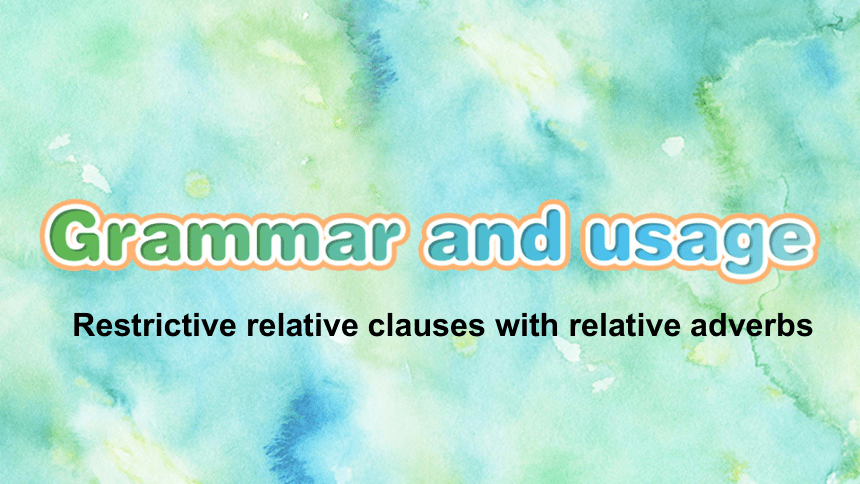
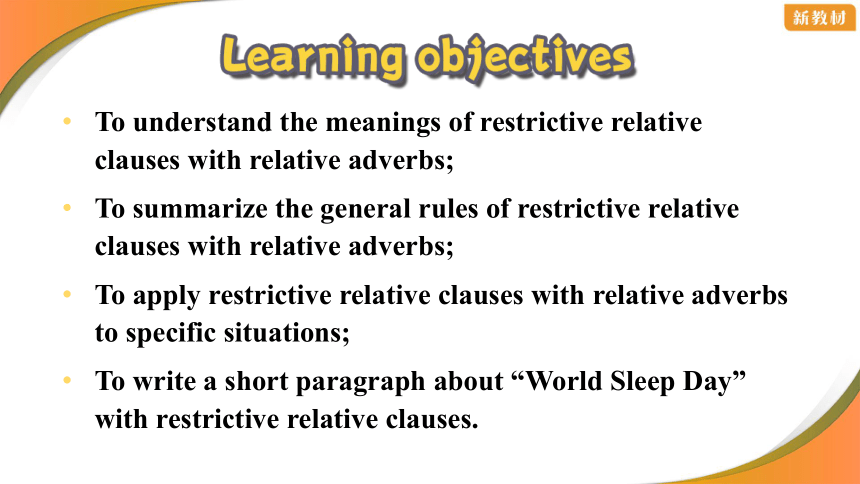

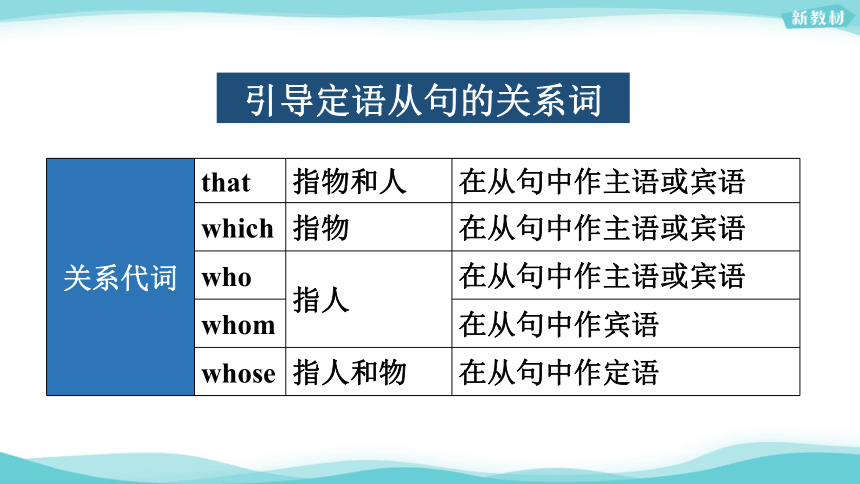
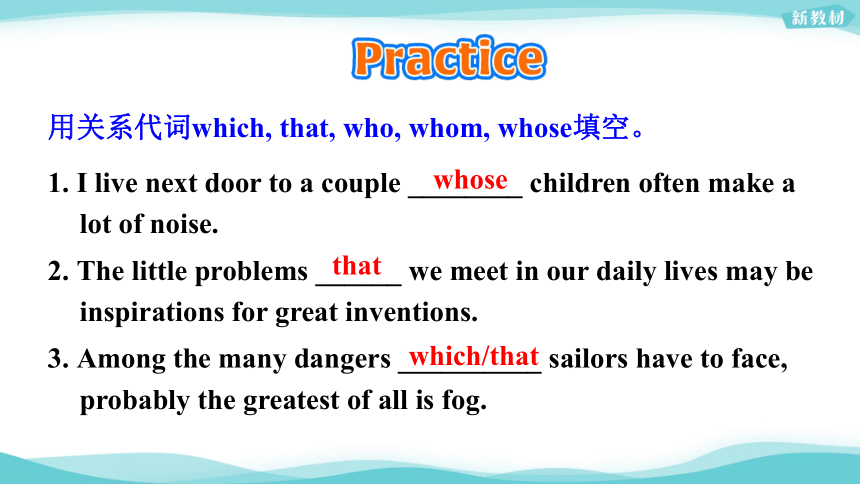
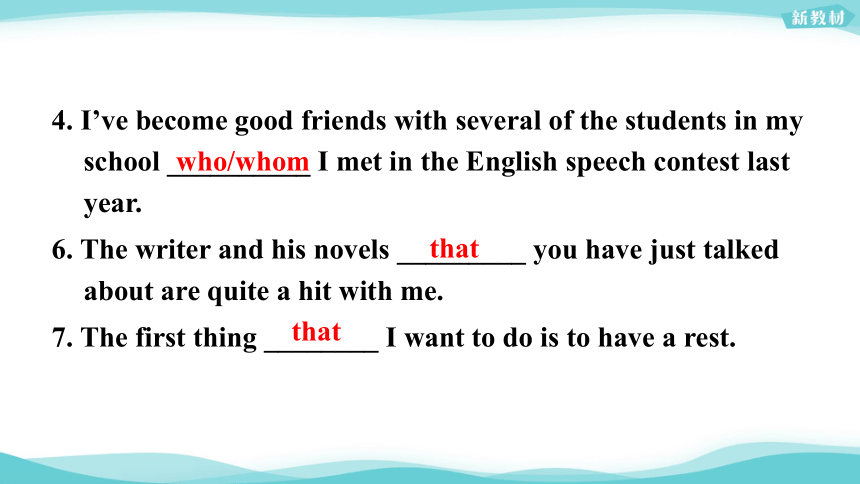
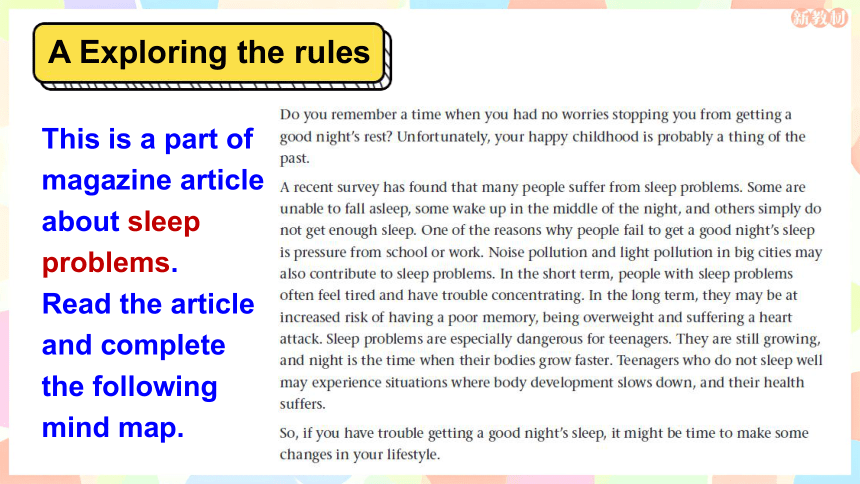
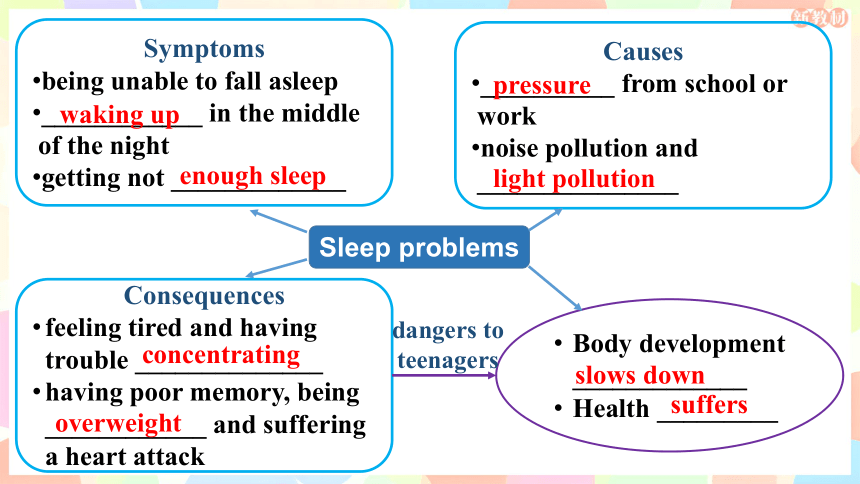

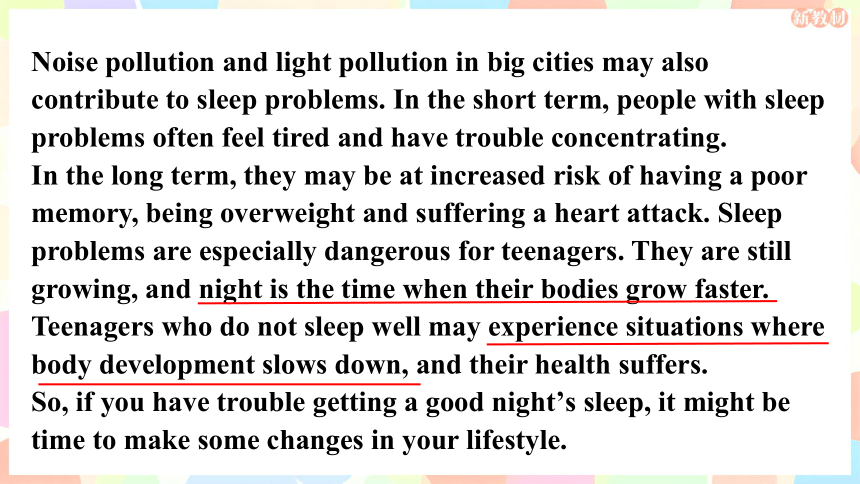
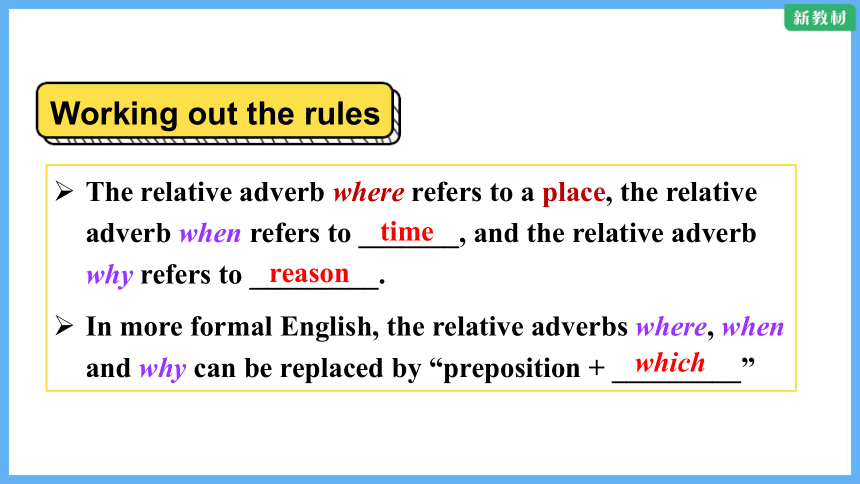
文档简介
(共51张PPT)
UNIT 4
Looking good, feeling good
Restrictive relative clauses with relative adverbs
To understand the meanings of restrictive relative clauses with relative adverbs;
To summarize the general rules of restrictive relative clauses with relative adverbs;
To apply restrictive relative clauses with relative adverbs to specific situations;
To write a short paragraph about “World Sleep Day” with restrictive relative clauses.
定义 用作定语的从句 类型 限制性 定语从句 描述主句所涉及的人或物的具体情况,是主句不可缺少的一部分;
从句如省去,主句意义不完整或失去意义。
关系词 关系代词 that, which, who, whom, whose 等
关系代词 that 指物和人 在从句中作主语或宾语
which 指物 在从句中作主语或宾语
who 指人 在从句中作主语或宾语
whom 在从句中作宾语
whose 指人和物 在从句中作定语
引导定语从句的关系词
用关系代词which, that, who, whom, whose填空。
1. I live next door to a couple ________ children often make a lot of noise.
2. The little problems ______ we meet in our daily lives may be inspirations for great inventions.
3. Among the many dangers __________ sailors have to face, probably the greatest of all is fog.
whose
that
which/that
4. I’ve become good friends with several of the students in my school __________ I met in the English speech contest last year.
6. The writer and his novels _________ you have just talked about are quite a hit with me.
7. The first thing ________ I want to do is to have a rest.
who/whom
that
that
This is a part of magazine article about sleep problems.
Read the article and complete the following mind map.
A Exploring the rules
Sleep problems
Symptoms
being unable to fall asleep
____________ in the middle of the night
getting not _____________
Causes
__________ from school or work
noise pollution and _______________
Consequences
feeling tired and having trouble ______________
having poor memory, being ____________ and suffering a heart attack
Body development _____________
Health _________
waking up
enough sleep
pressure
light pollution
concentrating
overweight
slows down
suffers
dangers to teenagers
Find the sentences with restrictive relative clauses in the article. The first one has been done for you.
Do you remember a time when you had no worries stopping you from getting a good night’s rest Unfortunately, your happy childhood is probably a thing of the past.
A recent survey has found that many people suffer from sleep problems. Some are unable to fall asleep, some wake up in the middle of the night, and others simply do not get enough sleep.
One of the reasons why people fail to get a good night’s sleep is pressure from school or work.
Noise pollution and light pollution in big cities may also contribute to sleep problems. In the short term, people with sleep problems often feel tired and have trouble concentrating.
In the long term, they may be at increased risk of having a poor memory, being overweight and suffering a heart attack. Sleep problems are especially dangerous for teenagers. They are still growing, and night is the time when their bodies grow faster. Teenagers who do not sleep well may experience situations where body development slows down, and their health suffers.
So, if you have trouble getting a good night’s sleep, it might be time to make some changes in your lifestyle.
The relative adverb where refers to a place, the relative adverb when refers to _______, and the relative adverb why refers to _________.
In more formal English, the relative adverbs where, when and why can be replaced by “preposition + _________”
time
reason
which
Working out the rules
关系副词引导的限制性定语从句
定语从句可以由关系副词(relative adverbs) when、where、why引导,关系副词在定语从句中作状语。
e.g. *He enjoyed the four years when he studied in Suzhou.
*That’s the cinema where we often go and see films.
Compare the following sentences.
He will always remember the day. His mother returned on the day.
He will always remember the day when/on which his mother returned.
This was the time. She left for Beijing at the time.
This was the time when/at which she left for Beijing.
We often use the relative adverb when to introduce a restrictive relative clause after nouns like time, moment, day, season, year, etc.
In formal English, when can sometimes be replaced by “preposition + which”.
用关系副词when时,先行词指时间。
when在定语从句中作时间状语,when可换成“介词+which”。
I still remember the day when I first came to Nanjing.
e.g. Mr Black was born in the year when World WarⅡ broke out.
= on which
= in which
The factory is in Shenzhen. He worked in the factory.
The factory where/in which he worked in Shenzhen.
This is the town. I was born in the town.
This is the town where/in which I was born.
We often use the relative adverb where to introduce a restrictive relative clause after nouns like place, house, city country, world, etc.
In formal English, where can sometimes be replaced by “preposition + which”.
用关系副词where时,先行词指地点。
where在定语从句中作地点状语,where可换成“介词+which”。
e.g. This is the farm where we worked when we were young.
The school where his mother teaches is in the west of the city.
= on which
= in which
I don’t know the reason. He didn’t come to school yesterday for the reason.
I don’t know the reason why/for which he didn’t come to school yesterday.
We often use the relative adverb why to introduce a restrictive relative clause indicating reason.
In formal English, why can sometimes be replaced by “preposition + which”.
用关系副词why时,先行词指原因。
why在定语从句中作原因状语,why可换成“介词+ which”。
e.g. There are several reasons why the boys should be punished.
Tom couldn’t give the teacher the reason why he was late for school.
= for which
= for which
“介词+ which/whom”引导的定语从句
当关系代词在定语从句中作介词的宾语时,通常用“介词+ which / whom”来引导定语从句。
如果关系代词指“物”,定语从句常用“介词+ which”引导
如果关系代词指 “人”,定语从句常用“介词+whom”引导
e.g. *Where is the supermarket in which you bought the juice
*Do you know the lady with whom our manager is talking in the office
在这类定语从句中,有些介词也可放在从句的末尾,此时可用that,which (指物),who或whom(指人)来引导定语从句。
注意:
“介词+ which / whom”引导定语从句时,介词的选择取决于从句中谓语动词的固定搭配、先行词的习惯搭配或句子要表达的意思。
e.g. This is the man whom / who / that I referred to.
关系副词的作用
①连接:连接定语从句和主句
②替代:关系副词=介词+which
③成分:在定语从句中一般作状语
关系副词 先行词 充当从句的成分
when 表时间的名词/名词词组 时间状语
where 表地点的名词/名词词组 地点状语
why 表原因的名词 原因状语
1) He enjoyed the four years ______ he studied in Suzhou.
when
【语境应用】用适当的关系词填空。
2) The village has developed a lot ________ my brother and I learned farming five years ago.
where
3) Life is like a long race ________ we compete with others to go beyond ourselves.
where
4) I don’t believe the reason ____________ he gave me yesterday and that’s the reason ______ I called him just now.
(which/that)
why
1. I did not perform well at school last week. The reason was my poor-quality sleep.
2. I miss those days. I used to sleep really well in those days.
The reason why/for which I did not perform well at school last week was my poor-quality sleep.
I miss those days when/in which I used to sleep really well.
Rewrite the following sentences using a relative adverb or “preposition +which”.
B Applying the rules
B1
3. The hospital is near my home. I visited a doctor for advice on sleep problems in that hospital.
4. I still remember that afternoon. That afternoon I fell asleep on the bus and went past my stop.
The hospital where/in which I visited a doctor for advice on sleep problems is near my home.
I still remember that afternoon when/on which I fell asleep on the bus and went past my stop.
1. I will never forget the day ______________ I first went to school.
I will never forget the day ______________ we spent in Beijing.
when / on which
(which / that)
2. The house ______________ we visited is being repaired now.
The house ______________ Lu Xun once lived is being repaired now.
(which / that)
where / in which
3. I like the city ______________ there is a beautiful lake.
I like the city ______________ has a beautiful lake.
where / in which
which / that
4. The reason ______________ he didn’t come to school yesterday is that he was ill.
The reason _____________ he gave isn’t true.
why / for which
(which / that)
The last part of the magazine article about sleep problems gives tips on how to sleep plete the passage with correct relative pronouns, relative adverbs or “preposition + which” where necessary.
Everyone knows that the amount of quality sleep (1) ____________ we get is important to us. How can we get a better night’s sleep Here are some tips for you.
(which/that)
B2
Tip 1: Try to go to bed and wake up around the same time each day. This helps set the body’s “clock”. Try to stick to your sleep schedule at the weekend too, even though
weekends are probably the time (2) _______________ you feel like a lie-in.
when / at which
Tip 2: Make your bedroom a place (3) ________________ you feel comfortable. Your bedroom needs to be cool, dark and quiet so you can sleep soundly.
Tip 3: Avoid drinks (4) ___________ may keep you from sleeping, such as coffee and tea.
where / in which
which/that
Tip 4: Clear your head of stress and worry from your day before bedtime. These negative thoughts are one reason (5) _______________ you stay awake after the light goes off.
why / for which
Answer the following questions.
1. What does “stick to your sleep schedule” mean
2. Why shouldn’t we drink coffee or tea before bedtime
Try to go to bed and wake up around the same time each day.
Because drinks like coffee or tea will keep us from sleeping.
用正确的关系词完成下面短文。
In celebration of what would have been the 93rd birthday of Hollywood actress Audrey Hepburn, 1. __________ was born in Brussels, the municipality ( 自治区) of Ixelles named a new park after her and erected a statue (立起一座雕像) of her.
In the 1960s, Hepburn became well-known around the world for her role in the movie Breakfast at Tiffany's, but few knew that the star was born in the Rue Keyenveld in Ixelles, 2. __________ she spent the first years of her life.
who
where
“The new park is located in the street 3. __________ she was born,” said Sean Hepburn Ferrer, Hepburn's son.
Originally trained as a ballet dancer, the young Hepburn played several small parts in various films, gaining much experience. In 1952, she was offered a starring role in Roman Holiday, 4. __________ was a great success. Hepburn received an Oscar for it. Gregory Peck, her acting partner in Roman Holiday, still remembered the period 5. __________ they shot in Rome. “She is one of the most skillful and intelligent (有才智的) actresses,” he said.
where
which
when
After 1967, Hepburn decided to devote herself to humanitarian aid for children, which was the reason 6. __________ she put an end to her film career. She later became an ambassador (大使) for the United Nations Children's Fund (UNICEF).
“I think she would say that this would draw too much attention,” Hepburn Ferrer said. “But she would be glad her statue is looking over a park 7. __________ children can play.”
why
where
1. One of the reasons why people fail to get a good night’s sleep is pressure from school or work.
pressure n. ① difficulties and worries that are caused by the need to achieve or to behave in a particular way 心理压力,紧张
② the force or weight with which something presses against something else 压力
③ the act of trying to persuade or to force somebody to do something 要求,催促
e.g. *You need to be able to handle pressure in this job.
*The nurse applied pressure to his arm to stop the bleeding.
*We are determined to keep up the pressure on the other member states.
e.g. * Teachers are under increasing pressure to work longer hours.
* I was under pressure from my parents to become a doctor.
* Advertisements put pressure on girls to be thin.
under pressure (from...) 承受着(来自……的)压力
put pressure on 施加压力
press vt. 按;压;敦促;催促
press sb. to do sth. 催促某人做某事
【语境应用】翻译句子。
1) 如今很多年轻人压力很大,经常熬夜。
2) 他们正催促我们立即作出决定。
Nowadays many young people are under great pressure and often stay up.
They are pressing us to make an immediate decision.
2. Noise pollution and light pollution in big cities may also contribute to sleep problems.
contribute ① vi.&vt. to be one of the causes of something
是……的原因之一
② vi. to give something, especially money or goods, to help achieve or provide something
捐赠,捐献
③ vi.&vt. to increase, improve or add to something 增添,添加
e.g. *Human error may have been a contributing factor.
*Would you like to contribute to our collection
*Immigrants have contributed to British culture in many ways.
contribute to 促成,造成;为……做出贡献;
向……捐款;有助于,导致
contribute... to... 把……捐给……
contribution n. 捐款;贡献;捐赠
make a contribution to 向……捐赠/捐款;
为……做出贡献
【语境应用】完成句子。
1) It is well known that UV radiation ______________ the development of skin cancer.
众所周知,紫外线辐射会导致皮肤癌的发展。
2) ______________________ the earthquake fund.
我们向地震基金捐赠了 5 000 英镑。
3) Rosa Parks made a great _____________(contribute) to the civil-rights movement in the U.S.
contributes to
We contributed 5 000 to
contribution
3. In the long term, they may be at increased risk of having a poor memory, being overweight and suffering a heart attack.
attack n. ① a sudden, short period of illness, usually severe
(尤指常发疾病的)发作,侵袭
② an act of using violence to try to hurt or kill somebody 袭击;攻击
e.g. *an attack of fever
*I had a bad attack of flu at Christmas.
*Five people were killed in the attacks that took place last night.
attack vt.&vi. ① to use violence to try to hurt or kill somebody 袭击;攻击
② to have a harmful effect on something 侵袭;损害
③ to criticize somebody/something severely
抨击;非难
e.g. *The man attacked him with a knife.
*a disease that attacks the brain
*His latest work has been bitterly attacked by the critics.
1) launch/make an attack 进行攻击
under attack 受到攻击
have/ suffer a heart attack 心脏病发作
2) attack sb. for (doing) sth. 因某事而抨击某人
attack sb. with sth. 用……攻击某人
【语境应用】完成句子。
1) 植物受到攻击时会做什么?
What does a plant do when it is ___________ attack
2) 昨天晚上一位女士遭到三个年轻男人袭击。
A woman ________ ________ by three young men last night.
3) 疾病已经侵袭了他的大脑。
The disease ________ ________ his brain.
has attacked
under
was attacked
Read the information about World Sleep Day. Then write a short paragraph using restrictive relative clauses where necessary. The beginning has been written for you.
B3
World Sleep Day Time The Friday of the second full week of March
Aims To make people understand the importance of good and healthy sleep
To draw society's attention to sleep problem
Activities Discussions and talks about the importance of healthy sleep
In a society where people are under a lot of pressure, sleep problems have become common…
In a society where people are under a lot of pressure, sleep problems have become very common. That is the reason why World Sleep Day is celebrated every year on the Friday of the second full week of March. Its aims are to make people understand the importance of good and healthy sleep and to draw society’s attention to sleep problems. It is a time when people have discussions and give talks about the importance of healthy sleep.
UNIT 4
Looking good, feeling good
Restrictive relative clauses with relative adverbs
To understand the meanings of restrictive relative clauses with relative adverbs;
To summarize the general rules of restrictive relative clauses with relative adverbs;
To apply restrictive relative clauses with relative adverbs to specific situations;
To write a short paragraph about “World Sleep Day” with restrictive relative clauses.
定义 用作定语的从句 类型 限制性 定语从句 描述主句所涉及的人或物的具体情况,是主句不可缺少的一部分;
从句如省去,主句意义不完整或失去意义。
关系词 关系代词 that, which, who, whom, whose 等
关系代词 that 指物和人 在从句中作主语或宾语
which 指物 在从句中作主语或宾语
who 指人 在从句中作主语或宾语
whom 在从句中作宾语
whose 指人和物 在从句中作定语
引导定语从句的关系词
用关系代词which, that, who, whom, whose填空。
1. I live next door to a couple ________ children often make a lot of noise.
2. The little problems ______ we meet in our daily lives may be inspirations for great inventions.
3. Among the many dangers __________ sailors have to face, probably the greatest of all is fog.
whose
that
which/that
4. I’ve become good friends with several of the students in my school __________ I met in the English speech contest last year.
6. The writer and his novels _________ you have just talked about are quite a hit with me.
7. The first thing ________ I want to do is to have a rest.
who/whom
that
that
This is a part of magazine article about sleep problems.
Read the article and complete the following mind map.
A Exploring the rules
Sleep problems
Symptoms
being unable to fall asleep
____________ in the middle of the night
getting not _____________
Causes
__________ from school or work
noise pollution and _______________
Consequences
feeling tired and having trouble ______________
having poor memory, being ____________ and suffering a heart attack
Body development _____________
Health _________
waking up
enough sleep
pressure
light pollution
concentrating
overweight
slows down
suffers
dangers to teenagers
Find the sentences with restrictive relative clauses in the article. The first one has been done for you.
Do you remember a time when you had no worries stopping you from getting a good night’s rest Unfortunately, your happy childhood is probably a thing of the past.
A recent survey has found that many people suffer from sleep problems. Some are unable to fall asleep, some wake up in the middle of the night, and others simply do not get enough sleep.
One of the reasons why people fail to get a good night’s sleep is pressure from school or work.
Noise pollution and light pollution in big cities may also contribute to sleep problems. In the short term, people with sleep problems often feel tired and have trouble concentrating.
In the long term, they may be at increased risk of having a poor memory, being overweight and suffering a heart attack. Sleep problems are especially dangerous for teenagers. They are still growing, and night is the time when their bodies grow faster. Teenagers who do not sleep well may experience situations where body development slows down, and their health suffers.
So, if you have trouble getting a good night’s sleep, it might be time to make some changes in your lifestyle.
The relative adverb where refers to a place, the relative adverb when refers to _______, and the relative adverb why refers to _________.
In more formal English, the relative adverbs where, when and why can be replaced by “preposition + _________”
time
reason
which
Working out the rules
关系副词引导的限制性定语从句
定语从句可以由关系副词(relative adverbs) when、where、why引导,关系副词在定语从句中作状语。
e.g. *He enjoyed the four years when he studied in Suzhou.
*That’s the cinema where we often go and see films.
Compare the following sentences.
He will always remember the day. His mother returned on the day.
He will always remember the day when/on which his mother returned.
This was the time. She left for Beijing at the time.
This was the time when/at which she left for Beijing.
We often use the relative adverb when to introduce a restrictive relative clause after nouns like time, moment, day, season, year, etc.
In formal English, when can sometimes be replaced by “preposition + which”.
用关系副词when时,先行词指时间。
when在定语从句中作时间状语,when可换成“介词+which”。
I still remember the day when I first came to Nanjing.
e.g. Mr Black was born in the year when World WarⅡ broke out.
= on which
= in which
The factory is in Shenzhen. He worked in the factory.
The factory where/in which he worked in Shenzhen.
This is the town. I was born in the town.
This is the town where/in which I was born.
We often use the relative adverb where to introduce a restrictive relative clause after nouns like place, house, city country, world, etc.
In formal English, where can sometimes be replaced by “preposition + which”.
用关系副词where时,先行词指地点。
where在定语从句中作地点状语,where可换成“介词+which”。
e.g. This is the farm where we worked when we were young.
The school where his mother teaches is in the west of the city.
= on which
= in which
I don’t know the reason. He didn’t come to school yesterday for the reason.
I don’t know the reason why/for which he didn’t come to school yesterday.
We often use the relative adverb why to introduce a restrictive relative clause indicating reason.
In formal English, why can sometimes be replaced by “preposition + which”.
用关系副词why时,先行词指原因。
why在定语从句中作原因状语,why可换成“介词+ which”。
e.g. There are several reasons why the boys should be punished.
Tom couldn’t give the teacher the reason why he was late for school.
= for which
= for which
“介词+ which/whom”引导的定语从句
当关系代词在定语从句中作介词的宾语时,通常用“介词+ which / whom”来引导定语从句。
如果关系代词指“物”,定语从句常用“介词+ which”引导
如果关系代词指 “人”,定语从句常用“介词+whom”引导
e.g. *Where is the supermarket in which you bought the juice
*Do you know the lady with whom our manager is talking in the office
在这类定语从句中,有些介词也可放在从句的末尾,此时可用that,which (指物),who或whom(指人)来引导定语从句。
注意:
“介词+ which / whom”引导定语从句时,介词的选择取决于从句中谓语动词的固定搭配、先行词的习惯搭配或句子要表达的意思。
e.g. This is the man whom / who / that I referred to.
关系副词的作用
①连接:连接定语从句和主句
②替代:关系副词=介词+which
③成分:在定语从句中一般作状语
关系副词 先行词 充当从句的成分
when 表时间的名词/名词词组 时间状语
where 表地点的名词/名词词组 地点状语
why 表原因的名词 原因状语
1) He enjoyed the four years ______ he studied in Suzhou.
when
【语境应用】用适当的关系词填空。
2) The village has developed a lot ________ my brother and I learned farming five years ago.
where
3) Life is like a long race ________ we compete with others to go beyond ourselves.
where
4) I don’t believe the reason ____________ he gave me yesterday and that’s the reason ______ I called him just now.
(which/that)
why
1. I did not perform well at school last week. The reason was my poor-quality sleep.
2. I miss those days. I used to sleep really well in those days.
The reason why/for which I did not perform well at school last week was my poor-quality sleep.
I miss those days when/in which I used to sleep really well.
Rewrite the following sentences using a relative adverb or “preposition +which”.
B Applying the rules
B1
3. The hospital is near my home. I visited a doctor for advice on sleep problems in that hospital.
4. I still remember that afternoon. That afternoon I fell asleep on the bus and went past my stop.
The hospital where/in which I visited a doctor for advice on sleep problems is near my home.
I still remember that afternoon when/on which I fell asleep on the bus and went past my stop.
1. I will never forget the day ______________ I first went to school.
I will never forget the day ______________ we spent in Beijing.
when / on which
(which / that)
2. The house ______________ we visited is being repaired now.
The house ______________ Lu Xun once lived is being repaired now.
(which / that)
where / in which
3. I like the city ______________ there is a beautiful lake.
I like the city ______________ has a beautiful lake.
where / in which
which / that
4. The reason ______________ he didn’t come to school yesterday is that he was ill.
The reason _____________ he gave isn’t true.
why / for which
(which / that)
The last part of the magazine article about sleep problems gives tips on how to sleep plete the passage with correct relative pronouns, relative adverbs or “preposition + which” where necessary.
Everyone knows that the amount of quality sleep (1) ____________ we get is important to us. How can we get a better night’s sleep Here are some tips for you.
(which/that)
B2
Tip 1: Try to go to bed and wake up around the same time each day. This helps set the body’s “clock”. Try to stick to your sleep schedule at the weekend too, even though
weekends are probably the time (2) _______________ you feel like a lie-in.
when / at which
Tip 2: Make your bedroom a place (3) ________________ you feel comfortable. Your bedroom needs to be cool, dark and quiet so you can sleep soundly.
Tip 3: Avoid drinks (4) ___________ may keep you from sleeping, such as coffee and tea.
where / in which
which/that
Tip 4: Clear your head of stress and worry from your day before bedtime. These negative thoughts are one reason (5) _______________ you stay awake after the light goes off.
why / for which
Answer the following questions.
1. What does “stick to your sleep schedule” mean
2. Why shouldn’t we drink coffee or tea before bedtime
Try to go to bed and wake up around the same time each day.
Because drinks like coffee or tea will keep us from sleeping.
用正确的关系词完成下面短文。
In celebration of what would have been the 93rd birthday of Hollywood actress Audrey Hepburn, 1. __________ was born in Brussels, the municipality ( 自治区) of Ixelles named a new park after her and erected a statue (立起一座雕像) of her.
In the 1960s, Hepburn became well-known around the world for her role in the movie Breakfast at Tiffany's, but few knew that the star was born in the Rue Keyenveld in Ixelles, 2. __________ she spent the first years of her life.
who
where
“The new park is located in the street 3. __________ she was born,” said Sean Hepburn Ferrer, Hepburn's son.
Originally trained as a ballet dancer, the young Hepburn played several small parts in various films, gaining much experience. In 1952, she was offered a starring role in Roman Holiday, 4. __________ was a great success. Hepburn received an Oscar for it. Gregory Peck, her acting partner in Roman Holiday, still remembered the period 5. __________ they shot in Rome. “She is one of the most skillful and intelligent (有才智的) actresses,” he said.
where
which
when
After 1967, Hepburn decided to devote herself to humanitarian aid for children, which was the reason 6. __________ she put an end to her film career. She later became an ambassador (大使) for the United Nations Children's Fund (UNICEF).
“I think she would say that this would draw too much attention,” Hepburn Ferrer said. “But she would be glad her statue is looking over a park 7. __________ children can play.”
why
where
1. One of the reasons why people fail to get a good night’s sleep is pressure from school or work.
pressure n. ① difficulties and worries that are caused by the need to achieve or to behave in a particular way 心理压力,紧张
② the force or weight with which something presses against something else 压力
③ the act of trying to persuade or to force somebody to do something 要求,催促
e.g. *You need to be able to handle pressure in this job.
*The nurse applied pressure to his arm to stop the bleeding.
*We are determined to keep up the pressure on the other member states.
e.g. * Teachers are under increasing pressure to work longer hours.
* I was under pressure from my parents to become a doctor.
* Advertisements put pressure on girls to be thin.
under pressure (from...) 承受着(来自……的)压力
put pressure on 施加压力
press vt. 按;压;敦促;催促
press sb. to do sth. 催促某人做某事
【语境应用】翻译句子。
1) 如今很多年轻人压力很大,经常熬夜。
2) 他们正催促我们立即作出决定。
Nowadays many young people are under great pressure and often stay up.
They are pressing us to make an immediate decision.
2. Noise pollution and light pollution in big cities may also contribute to sleep problems.
contribute ① vi.&vt. to be one of the causes of something
是……的原因之一
② vi. to give something, especially money or goods, to help achieve or provide something
捐赠,捐献
③ vi.&vt. to increase, improve or add to something 增添,添加
e.g. *Human error may have been a contributing factor.
*Would you like to contribute to our collection
*Immigrants have contributed to British culture in many ways.
contribute to 促成,造成;为……做出贡献;
向……捐款;有助于,导致
contribute... to... 把……捐给……
contribution n. 捐款;贡献;捐赠
make a contribution to 向……捐赠/捐款;
为……做出贡献
【语境应用】完成句子。
1) It is well known that UV radiation ______________ the development of skin cancer.
众所周知,紫外线辐射会导致皮肤癌的发展。
2) ______________________ the earthquake fund.
我们向地震基金捐赠了 5 000 英镑。
3) Rosa Parks made a great _____________(contribute) to the civil-rights movement in the U.S.
contributes to
We contributed 5 000 to
contribution
3. In the long term, they may be at increased risk of having a poor memory, being overweight and suffering a heart attack.
attack n. ① a sudden, short period of illness, usually severe
(尤指常发疾病的)发作,侵袭
② an act of using violence to try to hurt or kill somebody 袭击;攻击
e.g. *an attack of fever
*I had a bad attack of flu at Christmas.
*Five people were killed in the attacks that took place last night.
attack vt.&vi. ① to use violence to try to hurt or kill somebody 袭击;攻击
② to have a harmful effect on something 侵袭;损害
③ to criticize somebody/something severely
抨击;非难
e.g. *The man attacked him with a knife.
*a disease that attacks the brain
*His latest work has been bitterly attacked by the critics.
1) launch/make an attack 进行攻击
under attack 受到攻击
have/ suffer a heart attack 心脏病发作
2) attack sb. for (doing) sth. 因某事而抨击某人
attack sb. with sth. 用……攻击某人
【语境应用】完成句子。
1) 植物受到攻击时会做什么?
What does a plant do when it is ___________ attack
2) 昨天晚上一位女士遭到三个年轻男人袭击。
A woman ________ ________ by three young men last night.
3) 疾病已经侵袭了他的大脑。
The disease ________ ________ his brain.
has attacked
under
was attacked
Read the information about World Sleep Day. Then write a short paragraph using restrictive relative clauses where necessary. The beginning has been written for you.
B3
World Sleep Day Time The Friday of the second full week of March
Aims To make people understand the importance of good and healthy sleep
To draw society's attention to sleep problem
Activities Discussions and talks about the importance of healthy sleep
In a society where people are under a lot of pressure, sleep problems have become common…
In a society where people are under a lot of pressure, sleep problems have become very common. That is the reason why World Sleep Day is celebrated every year on the Friday of the second full week of March. Its aims are to make people understand the importance of good and healthy sleep and to draw society’s attention to sleep problems. It is a time when people have discussions and give talks about the importance of healthy sleep.
